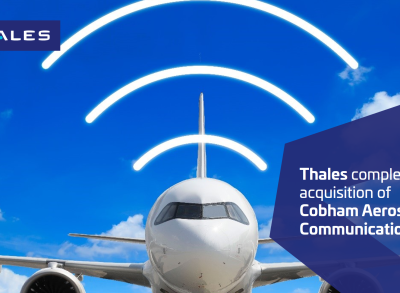Big data: Aeronautics enters a new era
The use of big data is revolutionising air transport. Providing instant access to a wealth of information, it optimises flights and improves customer service. With the focus on optimal connectivity, it is a tremendous catalyst for growth.

But already these new benefits fall into a few broad categories:
• Optimised flight management, providing increased security and substantial savings.
• A new and - potentially - vast range of services for customers, who will consequently be easier to retain.
• The emergence of a new market through the commercialisation of data.
• All in all, a significant increase in turnover for players in civil aviation.
A new market has emerged through the commercialisation of data
The first category - improved safety in flight, on the ground and in terms of operational performance - is probably the most important, in the eyes of passengers and companies alike.
With regard to weather conditions that could hamper smooth flight connections, crews can now estimate the most likely conditions the aircraft will face, using access to a cloud that stores all the climate data for a given area, recorded over time. Combined with the real-time information provided by the aircraft's sensors, and the information sent by ground control, this access to a specific cloud allows better management of the flight (altitude, optimal route, etc.). This means increased safety and improved flight comfort for passengers, as well as shorter flight times and therefore better fuel economy.
This acute evaluation of weather conditions via onboard sensors, ground control communications, and access to a specific online environment, finds its equivalent in real-time knowledge and monitoring of the functions - and potential malfunctions - of the plane within its flight environment. With the same positive effects.
If the aircraft’s measuring instruments are able, during flight, to detect foreseeable technical defects on certain components or sub-assemblies of the plane, and immediately transmit this data to the ground, then an effective and advantageous system can be implemented straight away, which also means additional security and cost savings for airlines. With advance warning, airport services and companies can put in place the appropriate means - specialist labour, materials and spare parts needed - to manage the defect identified on the plane, despite it still being in flight. Then the aircraft can be taken charge of upon landing and the maintenance operations required can be immediately carried out.
This predictive maintenance, through the real-time exchange of data and the fact that all parties are connected (both in flight and on the ground) to a shared cloud, leads to increased security, since a fault detected as soon as it is noticed is less likely to worsen and cause additional malfunctions. It also means less time spent maintaining the aircraft, allowing quicker rotation across the fleet of the airline concerned, through optimised monitoring, and therefore a significant gain in productivity. A plus for the airline... but also for its customers.
Big data, for optimised customer service
Since for these customers, this second category of benefits generated by the use of big data - bearing in mind the areas of progress mentioned so far - should mean fewer flight delays and cancellations due to weather or technical reasons.
In the event that these do occur, whatever happens it will be much easier to manage the situation of passengers affected by the incident, by being able to book hotel rooms much further in advance, since they are notified more quickly, allowing them to take steps accordingly.
Meanwhile, the use of big data will significantly improve customer service both in flight and on the ground. Using data recorded in flight or during online customer bookings, airlines will have a much better knowledge of these customers and their expectations. As a result, they will be able to provide a more customised service, helping build customer loyalty by giving them exactly what they need, whether in terms of in-flight entertainment, use of social media during flights, favourite hotel chains or car rentals, and even menus in some classes. With a clear picture of the customer profile for each destination, companies can adapt their services accordingly, focusing their efforts on high-value lines.
And in addition to all the benefits listed above, the data itself can also significantly increase the airlines’ turnover, since this data can be sold to interested partners: hotel chains, car rental companies, tour operators, and so on.
Security and defence: data at the heart of future issues
But it will be crucial for this data to be protected with regard to any kind of cyberattack, whether they target the cloud or are introduced during its sending. Access to passengers’ banking information and their “personalised” data must be highly secure. Companies risk losing their customers’ trust if the latter become exposed to embezzlement or disclosure of private information.
On another note, big data will also play a crucial role in military aviation issues over coming years. Thanks to a dedicated cloud, along with information transmitted from the ground and the sensors on aircraft, planes, helicopters and drones, big data will - just like for air transport - provide increased knowledge of the climatic and geomorphological environment, of enemy plans, and also the operation of planes. And the effects will be the same, in terms of facilitating action on the mission, of predictive maintenance, management of ammunition, refuelling, and so on. It will be possible for combat aircraft, and any other military equipment, to anticipate the opponent’s actions more easily and adapt accordingly. The result will be fewer losses and improved efficiency, offering higher chances of success thanks to a clearer overview of operations that is shared by all players, who will thus be able to interoperate in real time and in an optimal way.
Both in the civil and military environment, there need to be additional satellite services, with new secure frequencies, offering reliable and secure connectivity, in order make the most of sharing this big data. But the potential justifies the expense.
Find us on Twitter @ThalesAerospace, on our official Youtube channel Onboard TV and on LinkedIn Thales Aerospace.




